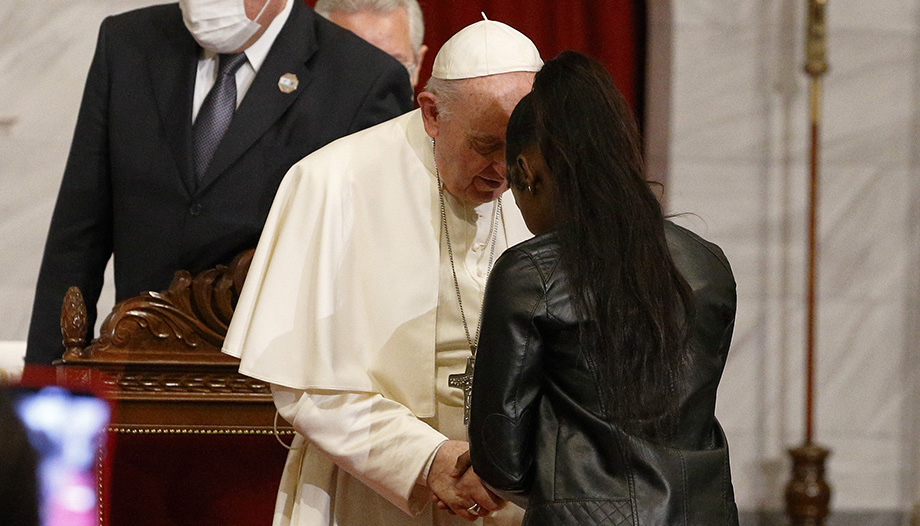It was in the parish church of the Holy Cross, a reference point of the Catholic community in Cyprus. Yesterday afternoon, Pope Francis had his long-awaited meeting with the migrants. There he listened to the testimonies of four young people who arrived in Cyprus seeking refuge, and before them he delivered a new and forceful speech calling for dignified conditions for those who have been forced to leave their land.
Afterwards, they raised together an ecumenical prayer and prayed the Our Father. Francis thus concluded his official activities on the island of Cyprus, and this Saturday he flies to Athens, the Greek capital. Almost simultaneously, the Pontiff will relocate 50 immigrants from Cyprus to the Vatican, the Cypriot Ministry of the Interior said in a statement.
"The Ministry of Interior wishes to express its sincere appreciation for the important initiative of Pope Francis and the Holy See to relocate 50 migrants from Cyprus to the Vatican," the note can be read in the note. The Cyprus Administration hopes that the Pope's move will help increase solidarity at the European level.
"Fellow citizens of the saints."
In his speech, the Pope thanked the testimonies of the migrants "with an enormous 'thank you' from the heart." "I had received the testimonies in advance, about a month ago, and they had moved me very much, and also today they have moved me," he said.
"But it is not only emotion, it is much more, it is the emotion that comes from the beauty of the truth, like that of Jesus when he exclaimed: 'I praise you, Father, Lord of heaven and earth, because you have revealed all these things to the little ones and have hidden them from the wise and the crafty' (Mt 11:25). I also praise the heavenly Father because this is happening today, here, as in the whole world, God is revealing his Kingdom to the little ones: a Kingdom of love, justice and peace.
"After listening to you," Francis added, "we better understand all the prophetic power of the Word of God which, through the Apostle Paul, says: 'You are no longer strangers and aliens, but fellow citizens with the saints and family of God.'"
They were words written to the Christians of Ephesus - not far from here - the Holy Father said. "Very distant in time, but so close that they are more timely than ever, as if they had been written for us today: 'You are not strangers, but fellow citizens'. This is the prophecy of the Church, a community that embodies - with all human limits - God's dream."
The protagonists of the four testimonies were quoted by the Pope. These are their names: "Mariamie, who comes from the Democratic Republic of Congo, and you have defined yourself as 'full of dreams'; "Thamara, who comes from Sri Lanka, and you say that 'I am often asked who I am'; "Maccolins, who comes from Cameroon, and you say that throughout your life you have been 'wounded by hatred'; and "Rozh, who comes from Iraq, and you say you are 'a person on a journey'."
"Dignity of the human person"
The Pope also assured in his words that "the Lord Jesus comes to meet us in the face of the marginalized and discarded brother, in the face of the despised, rejected and oppressed migrant. But also, as you said, in the face of the migrant who is on the way to something, to hope, to a more human coexistence. And so God speaks to us through his dreams.
"That this island, marked by a painful division, may become, with the grace of God, a workshop of fraternity. And it can be so on two conditions," he said. "The first is the effective recognition of the dignity of every human person (Fratelli tutti, 8); this is the ethical foundation, a universal foundation that is also at the heart of Christian social doctrine," he pointed out.
"The second condition is trusting openness to God, Father of all, and this is the 'leaven' we are called to be as believers. With these conditions it is possible for the dream to be translated into a daily journey, made up of concrete steps that go from conflict to communion, from hatred to love," the Pope added. "A patient journey that, day after day, makes us enter the land that God has prepared for us, the land where, if you are asked: 'Who are you,' you can answer with your face uncovered: 'I am your brother.'"
Message to the VII MED Dialogues Conference
In parallel to the trip, the Holy See has released a message from Pope Francis to the participants in the VII Med Dialogues Conference. The Holy Father points out, according to official Vatican media, that the migratory phenomenon in the Mediterranean shows that everything is connected, and warns us that a stable solution requires an approach capable of taking into account the multiple aspects linked to it.
The Rome MED Dialogues Conference is promoted annually by the Italian Ministry of Foreign Affairs and International Cooperation and the Institute for International Policy Studies, and aims to rethink the traditional approach to the Mediterranean area and seek new and shared responses to the important challenges it poses.
The Pope pointed out to them that the "mare nostrum" has a central geopolitical importance, the Mediterranean is the border, and therefore the meeting place of three continents, which are not only bathed by it, but touch each other in it and are therefore called to live together.
The Pontiff warns that politics and diplomacy must do everything possible to prevent the process of globalization from degenerating into the globalization of indifference. Above all, as demonstrated by the climate crisis and the pandemic, "proof that not only States, but even more so continents, can no longer ignore each other".









